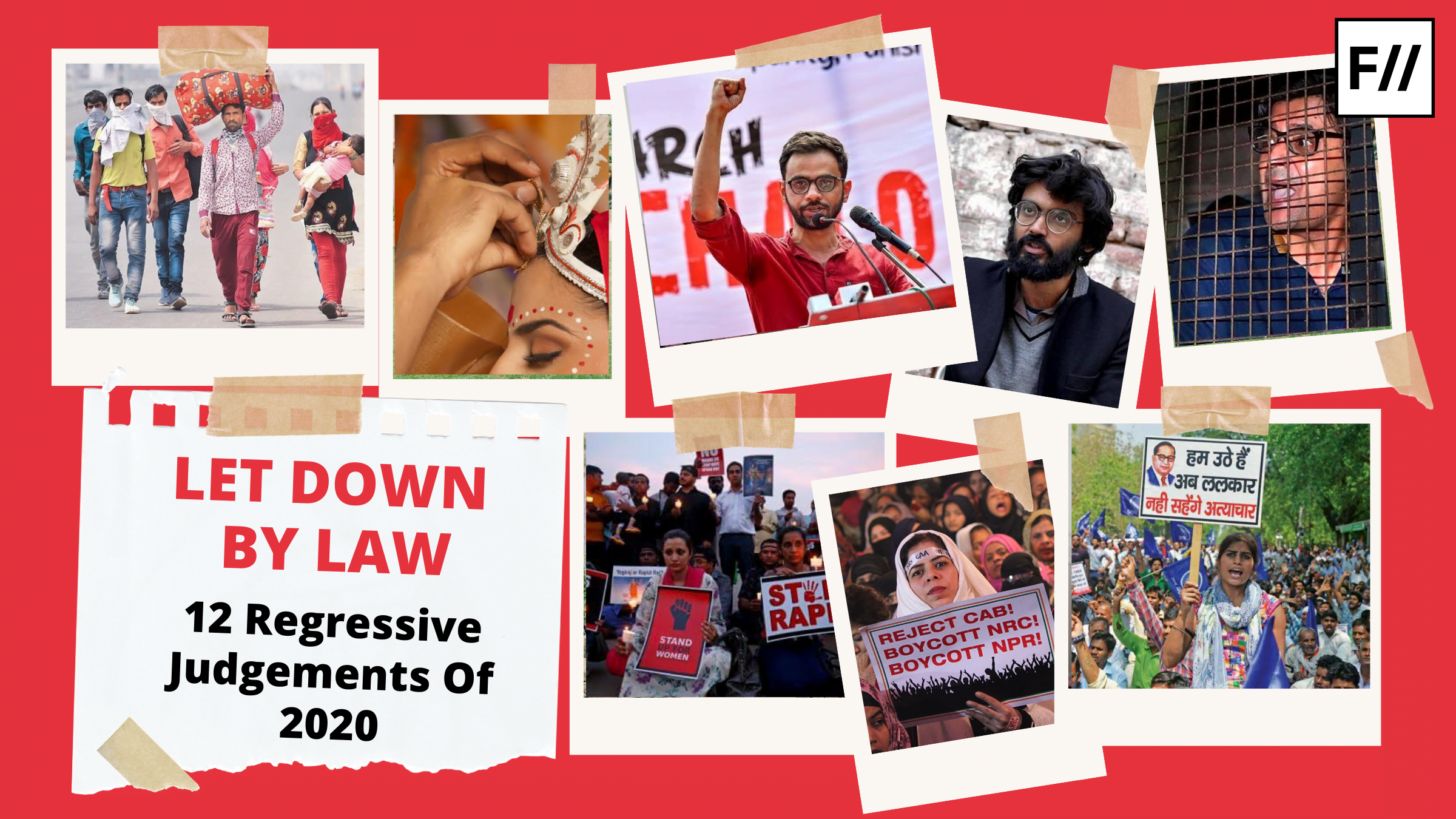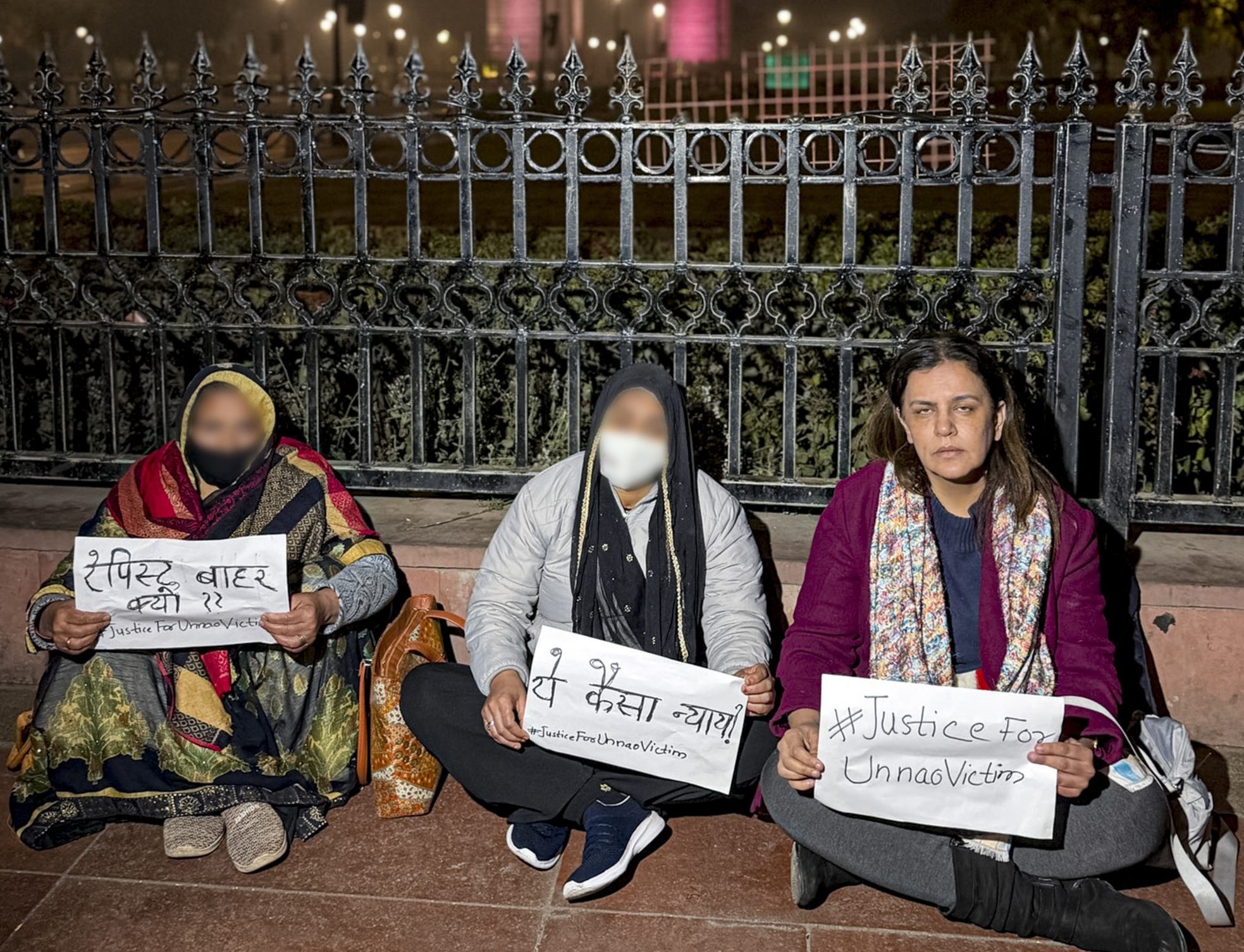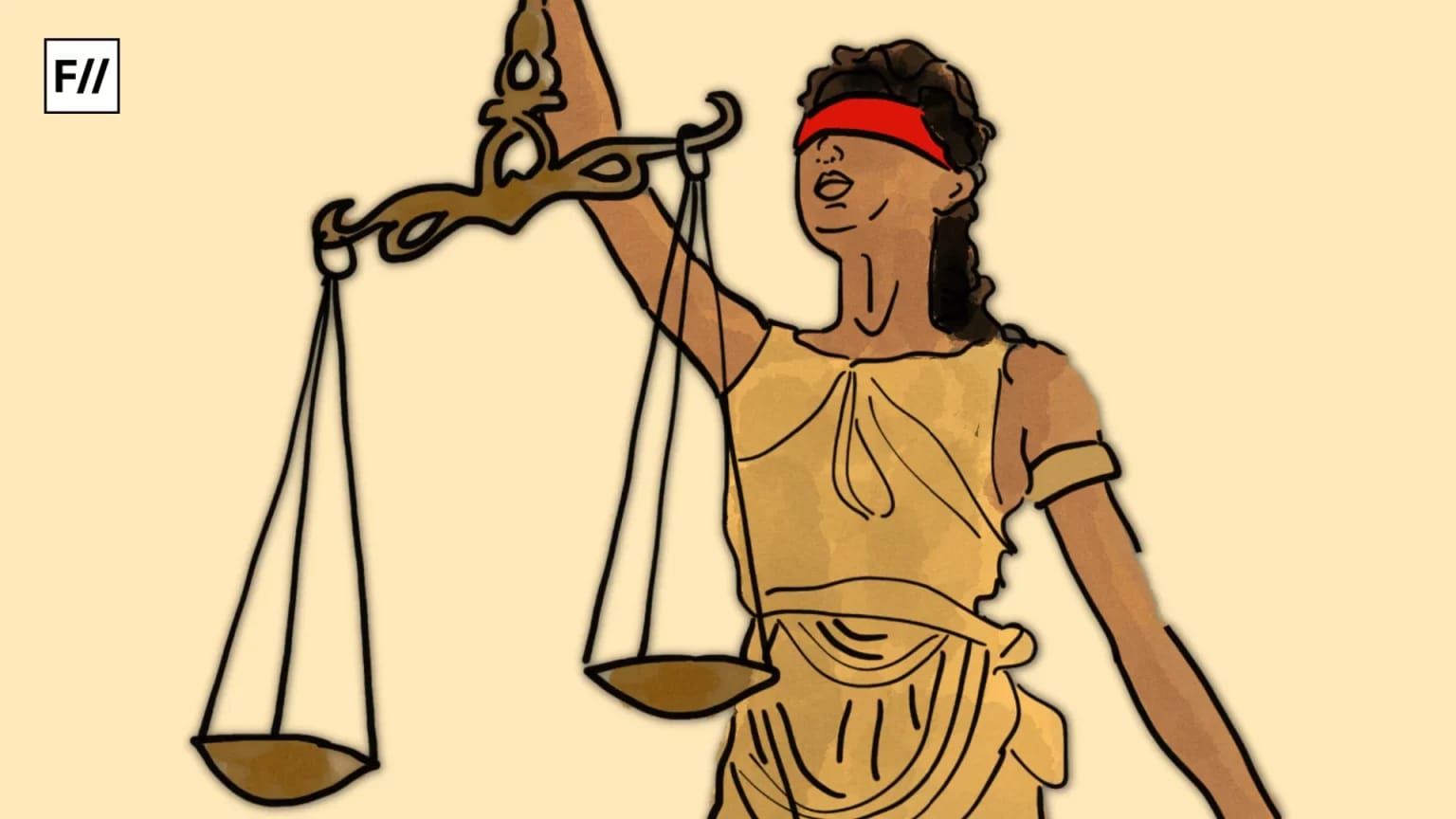To say India has ever realised and practised the ideal of a completely independent and impartial judiciary is a myth, in which people who consider India to be a fine example of democracy like to believe in. However, never had I thought that my eyes which once gleamed with hope at the prospect of the Supreme Court reversing a questionable High Court judgement, in a sort of way a child still has hopes that their authoritative father would say yes for a trip after having heard multiple no’s, would shut in despair as soon as the case lands at the table of the Hon’ble Supreme Court.
Many may raise their brows at the abject disdain I have for the apex court of India but I believe in today’s date, only a miracle can save the final verdict from not being one in contradiction with the highly regarded Constitutional principles that should be guiding the judiciary. An organ constituted to keep the legislature and the executive in check has become its mouthpiece, personifying the protective parent who would prefer covering up the faux-pas of their children to correcting them.
Following are 12 of the many judgements passed by the Indian judiciary this year that confirm my belief that the Holy Book citizens rely on for the protection of their rights is indeed in peril.
1. All 32 accused in the Babri Masjid demolition case acquitted
Amid a rehearsal a day before the actual demolition, a UP policeman joins kar sevaks in shouting slogan ‘Jai Shri Ram’, which came to be associated with the Ram Janmabhoomi movement
In an unprecedented move, a special court in Lucknow acquitted all the 32 accused in the 1992 Babri Masjid demolition case – one of the darkest days and a shameful blot on the fabric of secular India. The list of people accused in razing the Babri mosque on 6 December 1992 has the mention of BJP veterans L.K. Advani and Murli Manohar Joshi who were the face of Ramjanmabhoomi movement. The disputed structure was demolished by karsevaks, allegedly incited by Vishwa Hindu Parishad, RSS and BJP leaders, even as the claim was being discussed in court.
According to LiveLaw, the judge acquitted all the accused persons on the basis of negligible authentic evidence against the Hindutva leaders. He said, that there was not enough evidence to prove that the demolition was pre-planned and the accused persons were only present there “to stop the mob and not incite them”. The most startling statement made by the court is perhaps the total dismissal of audio and video evidence produced by the CBI officials involved in the case since the beginning of court trials.
When the Babri Masjid was being demolished, many BJP leaders Murli Manohar Joshi, then-president of the BJP, L.K. Advani and Vijayaraje Scindia were at the site (top)
Advani during his arrest in New Delhi. To his right is wife Kamla Advani and, in front, Narendra Modi (bottom)
In an article published in The Print, the media house’s National Photo Editor, Praveen Jain writes what he witnessed in Ayodhya on 5 December 1992. He describes the scenes of kar sevaks rehearsing the demolition of the Babri Masjid that stood on that piece of land, how bricks with the carving Jai Shri Raam were brought to Ayodhya and the hideous way in which the demolition of the centuries-old structure unfolded the very next day. Jain expressed his utter disappointment at the court rejecting the photos captured by him as “authentic evidence”.
2. Supreme Court observes all insults to persons belonging to Dalit or tribal communities will not be considered an offence under the SC/ST (Prevention of Atrocities) Act
Hearing an appeal filed by a man contesting the Uttarakhand High Court order, Hitesh Verma, charged with humiliating a Dalit woman with casteist abuses under the SC/ST (Prevention of Atrocities) Act, Supreme Court Nageshwar Rao said in his judgement, “Offence under the Act is not established merely on the fact that the informant [complainant] is a member of Scheduled Caste unless there is an intention to humiliate a member of Scheduled Caste or Scheduled Tribe for the reason that the victim belongs to such caste”.
The bench observed that the parties were involved in a property litigation over the possession of a land. Hence, the person abusing the other party claiming ownership should be tried under ordinary criminal law and not under Section 3(1)(r) of the Act, thereby limiting the scope of protection the law provides to disadvantaged communities.
Further, the court stated that the allegations leveled by the plaintiff do not fulfil the basic criteria under the Act that specifies such humiliation should have happened in public view. Since the incident in question happened within the four walls of the woman’s house, the conflict between the two could not be considered public humiliation of a Scheduled Caste person in the eyes of law.
3. Karnataka High Court grants Anticipatory Bail to Rape Accused on finding Victim’s Allegations Questionable
The recent judgement passed by the Karnataka High Court which granted anticipatory bail to a rape accused, questioning the allegations made by the victim has proved yet again that the law and order system of India is still alarmingly misogynistic. The sexist and victim-blaming nature of observations made by Justice Krishna Dixit made every Indian woman who encounters some sort of sexual harassment regularly feel unsafe.
While granting pre-arrest bail to a 27-year-old, accused of sexually assaulting his employer in May, Justice Krishna S Dixit noted that it was “unbecoming of an Indian woman” to sleep after she is ravished, “that is not the way our women react”. The High Court judge considered the woman having “drinks” with the accused and not raising an alarming immediately as valid grounds for questioning the genuineness of the complaint.
4. MP High Court gives Conditional Bail to Sexual Offender on Getting Rakhi tied by his Victim
In a similar case, the Madhya Pradesh high court granted conditional bail to a sexual offender that made women wonder if we are in the 1800s again. The court found a highly problematic way of penalising the accused, in a fashion local Khap Panchayats resolve disputes. The court instructed the accused to, “visit the house of the complainant with rakhi thread/band on August 3 at 11 am with a box of sweets and request the complainant to tie the rakhi band to him with the promise to protect her to the best of his ability for all times to come.”
The deeply problematic judgement could only be translated as a settlement made on the victim’s behalf, for having her dignity and bodily autonomy being violated in return for a box of sweets and a meagre Rs 11,000 but no justice.
5. Gauhati HC granted Divorce for Woman’s Refusal to Wear ‘Sindoor’, ‘Shaka’
Outshining every other problematic judgement this year is the one passed by the Gauhati High Court, approving a divorce on the grounds of unfulfillment of matrimonial obligations by the wife. The court took the stance that the woman refusing to wear the primordial and traditional markers of marriage like shakha (conch shell bangle) and sindoor (vermillion on the forehead) is tantamount to unacceptance of the marriage.
On hearing the matrimonial appeal filed by the husband, a division bench comprising Chief Justice Ajai Lamba and Justice Soumitra Saikia went against the order of the family court which had dismissed the husband’s claim of having faced cruelty at the hands of his wife. The court was of the view that keeping the husband from taking care of his parents is also an act of cruelty and violence.
6. Supreme Court declared Andhra Pradesh Government’s 100% Reservations Policy for ST Teachers in Scheduled Areas Unconstitutional
Quashing a relatively progressive preference scheme that provided 100% reservation for teachers hailing from Scheduled Tribes communities at schools situated in scheduled areas in Andhra Pradesh, the Supreme Court declared it constitutionally invalid and further, penalised the state government with a fine of Rs 5 lakh. The five-judge Constitution Bench presided over by Justice Arun Mishra and comprising Justices Indira Banerjee, Vineet Saran, MR Shah and Aniruddha Bose declared the order “arbitrary” for exceeding the 50% ceiling on quotas, laid down in the Indira Sawhney case.
In response to the Supreme Court’s order, Andhra Pradesh CM Jagan Mohan Reddy has extended his assurance to the tribal community saying that the GO No 3, which states the reservation policy would stay in place. He has asked the teacher aspirants from tribal communities to not worry about the apex court’s decision as he will bring up the issue with the state Advocate General S Sriram and devise legal measures for protecting the rights of STs.
7. KUWJ Journalist Kappan’s Bail Plea Rejected by Supreme Court
The arrest of Kerala Union of Working Journalists’ Siddique Kappan is a classic attempt at throttling the neck of freedom of press guaranteed by the Constitution of India. Unfortunately, when the guardians of the Constitution become the guardians of the state, you can expect little from the top court of India like in the case of Kappan.” The bench comprising CJI S.A. Bobde and Justices A.S. Bopanna and V. Ramasubramanian while hearing the habeas corpus petition of Kerala-based journalist, rejected his bail plea. Kappan’s crime was performing his duty as a journalist – travelling to Hathras to cover the news of a brutal gang rape committed by upper caste men on a Dalit woman.
Responding to senior advocate Kapil Sibal’s question regarding why Republic TV head Arnab Goswami’s bail plea was approved in a similar situation, the Supreme Court observed, “Every case is different.”
While on one hand, the court granted bail to Goswami who was arrested by the Maharashtra Police over a 2018 abetment-to-suicide case and even stressed on how precious the tenet of personal liberty is, at Kappan’s hearing on November 16, the CJI said, “We are trying to discourage Article 32 petitions” which sparked up a controversy.
8. Shaheen Bagh-type protests are not acceptable and the administration ought to take action to keep such areas clear of any encroachments or obstructions by citizens protesting, said the SC in Amit Sahni v Commissioner of Police & Others.
At the heart of the anti-CAA movement was perhaps the longest sit-in protest led by women in recent times, the Shaheen Bagh protest that garnered nationwide attention, with celebrities showing their support to the women of Shaheen Bagh as well. As could be predicted, it did not sit well with the government and very soon after, the Supreme Court gave a ruling in alignment with the Centre government’s opinion. Addressing a petition seeking the removal of the Shaheen Bagh protest in Okhla, the Supreme Court ordered that public places cannot be occupied indefinitely.
Justice Kaul was quoted as mentioning the menace that social media channels creates and how Shaheen Bagh which “started out as a protest and caused inconvenience to commuters”. Kaul further directed the concerned authorities to clear the road of ‘encroachments and obstructions’ and observed “indefinite protests in a common area” can not be allowed. Contradicting rumours created around the protest and the alleged nuisance it was responsible for, a Scroll report uncovered the fact that it was in fact, Delhi and UP police that had barricaded two alternative routes citing ‘security reasons’.
9. Court sends Umar Khalid to judicial custody till October 22 in UAPA case
Arrested in connection with communal riots in North-east Delhi under the controversial UAPA law, Anti-CAA activist and a member of United Against Hate, Umar Khalid was sent for a ten-day police custody by the Delhi High court. Umar Khalid who was arrested on September 13, was awarded an extended judicial custody till October 22 by the The Delhi High court. Umar Khalid’s Counsel Sanya Kumar has opposed his extended custody, calling it “illegally and mechanical” as prior information/documentation required before proceedings was not given to Khalid’s lawyers. “Time and time again the remand was mechanically granted. Case diaries were not signed, we were not supplied a copy of the remand application,” she alleged.
10. Supreme Court refused to pass Interim Orders in Anti-CAA Activist Sharjeel Imam’s Case
Applying the same rationale with anti-CAA activist Sharjeel Imam, the Supreme Court adjourned the hearing of Imam’s bail plea and declined the defense counsel’s request to pass an interim order clubbing the multiple FIRs levelling sedition charges against him. The former JNU student Sharjeel Imam was booked under UAPA for allegedly making inflammatory speeches at Aligarh Muslim University and insitigating the Jamia riots. The Supreme Court ruled that it “cannot pass interim orders” without receiving the replies of all the five States (Delhi, Uttar Pradesh, Assam, Manipur and Arunachal Pradesh) on Imam’s bail plea.
11. Supreme Court refuses to interfere By ordering Government to provide Relief Measures to Migrant Workers
Crossing the threshold of apathy, the Supreme Court refused to intervene and issue orders to the government for ensuring relief measures for migrant workers are undertaken. “We don’t plan to supplant wisdom of government with our wisdom”, was the sole justification given by the CJI.
Adjourning the hearing of the PIL that sought directions ordering the government to guarantee minimum wages to migrant daily wage workers so that their survival during the lockdown is ensured, the bench comprising of Chief Justice SA Bobde, Justices Sanjay Kishan Kaul & Deepak Gupta maintained that the court could not interfere in government’s approach regarding the rehabilitation of migrant workers.
12. Prashant Bhushan charged With Contempt of Court in Relation with his Tweets
The Indian judiciary has been using the regressive and outdated law of ” contempt of court” quite liberally to suppress any criticism against its functioning. in August, the Supreme Court charged lawyer and activist Prashant Bhushan with contempt of court for his tweets critiquing the Indian judiciary. The Supreme Court imposed a fine of Re 1 on Prashant Bhushan, adding that he would be jailed for three months and barred from practising for three years if he failed to pay the fine.
In his separate plea filed, Bhushan has proposed procedural changes to discourage “arbitrary, vengeful and high-handed decisions” in criminal contempt cases where the apex court is the aggrieved party, the “prosecutor, the witness and the judge”, strengthening the chances of judgements borne out of an inherent bias.
Constitutional experts and political analysts, recognised-unrecognised, are of the view that the period India is transitioning through today is a similar replication of 1975 India under Congress, just that this Emergency is undeclared and with the wholehearted consent of the majority. To them, I may remind, the case of Justice Hans Raj Khanna who had once said,“The history of personal liberty is largely the history of insistence upon procedure.”
The exemplary case of Justice H. R. Khanna who sacrificed his chances of earning chief justiceship to stand true to his principles against the strong influence of the Indira Gandhi government. Justice Khanna was the only Supreme Court judge to have given a statement against the Centre government and in favour of fundamental rights that promise the right to life and personal liberty to every citizen in the infamous ADM Jabalpur case, at the cost of CJI’s chair.
While the other four justices, Chief Justice A.N. Ray, Justice M. H. Beg, Justice P.N. Bhagwati and Justice Y.V. Chandrachud maintained the view that with the imposition of internal emergency that provides for suspension of the Fundamental Rights, no writs including habaes corpus could be adjudicated upon by the apex court, Justice Khanna stood tall as the firm advocate of fundamental rights. The Supreme Court of today should look back to the case of Justice Khanna and draw inspiration from his valaour. Before charging dissenting activists with charges of contempt of court, they must remember the following words of Justice Khanna –
“Courts must earn reverence through the test of truth.”
Reference:
- The Supreme Court Seems to Be Vacillating Between Being Progressive and Regressive, The Wire
- Before Memory Fades Away: An Autobiography, Fali S. Nariman
- Tracing The Colonial Past Of Modern Indian Regressive Laws, Feminism In India
- Tilting the Scale: Gender Imbalance in the Lower Judiciary, Vidhi Legal Policy
- Judicial Aberrations on Gender Issues Are Worrisome, The Wire
- Judges, castes and social justice, The Hindu
- 43 years since Emergency: A look back at HR Khanna, the judge who stood up to Indira Gandhi, Firstpost
About the author(s)
Deepshi Chowdhury is an eager political commentator struggling through her history honours course at LSR, Delhi. Painting revolutionary art and curating fusions of incompatible delicacies are her only two passions besides harbouring a penchant for articulating her meek dissenting voice through her mighty pen while listening to Faiz. Her words and portraits of Old Delhi's dilapidated doors are her only legacy.





Is this portal is about feminism or leftism?
be clear.
Feminism is leftism. Most of the cases they have reported have their own story but to create a fake narrative, FII has given a twist. Eg,
in 3. it’s a classic case of “sex of promise of marriage”. A relationship turned sour and filed as rape to get back
4 is a classic false sexual harassment accusation which is way too common. People asking to return borrowed money often get accused of sexual harassment (they didn’t mention it here for obvious reasons)
5 is a classic twist given to male domestic violence where the woman was preventing her husband to take care of his elder parents
12 is just selective activism about freedom of speech. We all know how they behaved around Kabir Singh
Read feminist theory and yes you would know it is based on leftist ideals of equity abd justice.
Great piece Deepshi!